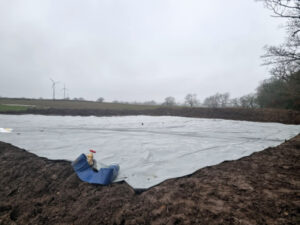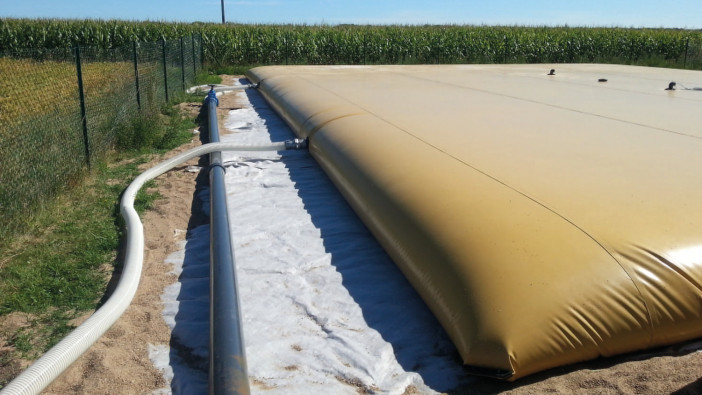Profitable Farming Company offers the Serena range of slurry bags, which could prove to be vitally important as farmers balance maximising the use of their slurry with the capital investment required to meet new legislation.
In the realm of modern agriculture, the delicate balance between productivity and environmental responsibility has become a critical concern. Nutrient Management Plans (NMPs) and Nitrate Vulnerable Zones (NVZs) have been established in the UK to regulate and mitigate the environmental impact of agricultural activities.
One effective solution gaining prominence in adhering to these regulations is the utilisation of slurry bags. These innovative systems offer both short and long-term benefits, ensuring compliance with legislation while contributing to the sustainability of agriculture.
Understanding NVZs and Legislation:
NVZs are designated areas where water pollution from agricultural sources poses a significant risk. The areas which are not NVZ still have compliance rules but are more relaxed, identifying the legal requirements is essential to not falling foul to code for good practice.
In the UK, these zones are identified based on nitrate and phosphate levels in the water. To combat water pollution, legislation requires farmers in NVZs to adhere to strict rules regarding nutrient application, storage, and management. Failure to comply can result in penalties and damage to the environment. This is where slurry bags play a pivotal role in supporting farmers in meeting these legal requirements.
 Short-term Application
Short-term Application
- Compliance with NVZ Regulations: Slurry bags offer a practical and efficient solution for farmers to store and manage agricultural by-products, such as slurry, effluent, digestate and other liquids. By adopting slurry bags, farmers can comply with regulations on nutrient storage and prevent nutrient leaching into water courses, a common concern in NVZs.
- Reduced Environmental Impact: The short-term application of slurry bags involves preventing immediate runoff and leaching of nutrients into water sources. By providing a secure and impermeable storage solution, slurry bags help mitigate the environmental impact of nutrient pollution, safeguarding water quality in the short term.
- Flexibility in Storage: Slurry bags offer flexibility in terms of storage location, allowing farmers to strategically place them based on crop needs and land topography. This flexibility enhances the efficiency of nutrient application, reducing the risk of overloading specific areas and minimising the potential for nutrient runoff.
Long-term Application
- Preservation of Soil Health: Over the long term, slurry bags contribute to soil health by preventing nutrient imbalances and depletion. Proper nutrient management, facilitated by slurry bag usage, ensures that the soil retains its fertility, promoting sustainable and productive agriculture for years to come.
- Minimisation of Greenhouse Gas Emissions: Slurry bags not only address nutrient management but also play a role in reducing greenhouse gas emissions. By containing and capturing methane produced during the anaerobic decomposition of stored organic matter, slurry bags contribute to mitigating climate change impacts associated with agricultural activities.
- Enhanced Crop Yields and Quality: Long-term use of slurry bags allows for precise nutrient application, promoting optimal crop growth. By avoiding nutrient loss through leaching, farmers can improve both the quantity and quality of their crops, ensuring sustained agricultural productivity while adhering to NVZ regulations.
Importance from the Perspective of Sustainability
- Resource Efficiency: Slurry bags promote sustainable agriculture by optimizing the use of nutrient resources. The controlled and targeted application of nutrients reduces waste and promotes resource efficiency, aligning with the principles of sustainable farming practices.
- Biodiversity Conservation: Sustainable agriculture emphasises the conservation of biodiversity. Slurry bags, by preventing nutrient runoff, contribute to the protection of aquatic ecosystems, preserving the diversity of flora and fauna in water bodies. This conservation effort supports the broader goal of maintaining ecological balance in agricultural landscapes.
- Economic Viability: The long-term sustainability of agriculture is intrinsically linked to economic viability. By adhering to NVZ regulations through the use of slurry bags, farmers can avoid penalties and foster a positive public image, ensuring the continued economic viability of their operations.
In conclusion, the importance of using slurry bags in adhering to UK legislation surrounding NVZs cannot be overstated. These storage systems offer both short and long-term benefits, ensuring compliance with regulations while contributing to the sustainability of agriculture.
By minimizing environmental impact, preserving soil health, and promoting resource efficiency, slurry bags emerge as a crucial tool in the pursuit of a harmonious balance between agricultural productivity and environmental responsibility. As agriculture continues to evolve, embracing technologies like slurry bags becomes imperative for a resilient and sustainable future.
PFC offer the Serena storage bag made from 1400g/m2 PVC. This is an industry leader being 8-15% heavier than the competitors improving the service life. For liquids other than slurry or digestate Serena offers a lighter grade as the product is not so aggressive on the PVC. Quality and the correct grade for the waste being stored are essential for the economic return on investment while protecting the environment.
To find out more about the Profitable Farming Company, you can follow their Facebook page


